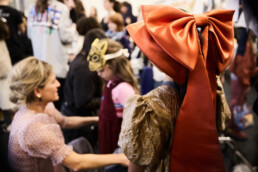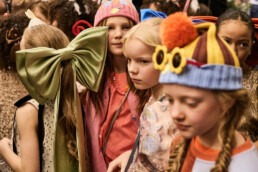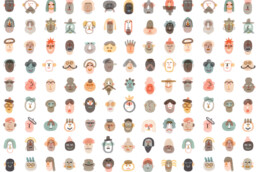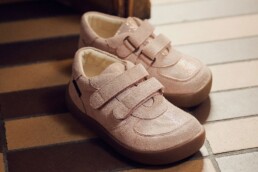Britain will later today hand deliver it’s letter of resignation to the President of the European council and so the 2 year Brexit negotiation begins. How this divorce will ultimately affect Britain, Europe and business only time will tell, it is however clear that we are in for a prolonged period of uncertainty and quarrelling. But whilst politicians, lawyers, advisors and such like work out terms it will be business that is left to get on with making it work.
What might Brexit actually mean for children’s fashion in the UK, Europe and further afield? In this first part we look at Brexit from the British point of view. We talk to a number of leading figures from retail, trade and manufacturing in the UK all of them offering their own distinct perspective.
Like any major political and economic watershed, it’s difficult to predict exactly how things will unfold. London’s mayor launched a well-timed ‘London’s Open for Business’ campaign at the end of 2016 to reassure the world about the city’s dynamic and cosmopolitan credentials. It still hosts some of the world’s foremost design schools, ateliers and workshops. That’s unlikely to change overnight, though restrictions on foreign students and expats could weigh heavily on the choice talented individuals make about where to ply their trade. Has Britain’s cultural cache’ or soft power taken a knocking? Almost certainly, although times of uncertainty and dislocation can also act as great catalysts for creativity, even as things become more challenging economically. The steep decline in the value of the British Pound has also attracted a small flood of luxury buyers and made Britain’s exports more competitive – approximately 80% of the UK fashion industry’s output goes overseas.
In September 2016 the first ‘Make it British’ Forum took place in Leicester, a town synonymous with UK clothing manufacturing producing 1 million garments per week. The one day event was aimed at businesses wishing to find out about manufacturing fashion and textile products in the UK. One of the issues discussed on the day was the likely impact of Brexit on the UK textile industry. Whilst the general mood on the subject was a little glum, moving forward the feeling was that there should be a focus on forging partnerships between brands, universities and manufacturers which would be key to the continuation of the UK clothing and textile sector.
The following interviews took place at the end of last year whilst there was still talk of challenging the referendum result and putting a halt to triggering article 50.
Retailer
Ashlyn Gibson – Olive Loves Alfie

Ashlyn ran her own label in the 80’s and went on to become the Creative Director for Footwear at Britain’s iconic label ‘Red or Dead. In 2006 she established Olive Loves Alfie, a children’s store in London with a hand picked selection of inspiring and imaginative children’s clothing, home-wares, toys and games. Over the years Olive Loves Alfie has grown into so much more than a store, it has become a breeding ground for many collaborative projects and creative events for children, helping designers to develop their ideas.
How has Brexit affected you?
Waking Olive my 13 year old daughter the morning after the Brexit vote was really upsetting. Breaking the news was like telling her that a Grandparent had died. Sounds dramatic but the kids who are too young to vote in the UK in my experience were outraged at the outcome that will have a huge impact on their future. My view is that we live in “one world” so for me and Olive the outcome is catastrophic.
From a business perspective it makes sense to focus more on British made and British designed products for my store. Its something we have always tried to support and that we are passionate about, but premium prices have made it difficult in the past. The change in the exchange rate plays to the hands of British designers supplying UK stores but personally I don’t know anyone who is happy about the outcome.
Comment : Premium price is an issue that arrises time and time again when selling items manufactured in the UK wholesale to retailers – small runs, work force costs and high rates have a knock on affect to the cost price and in turn bump up the wholesale and RRP. Some businesses address this issue by reducing their own margins on the item to get the product into stores but this isn’t sustainable if the cost of manufacturing in the UK keeps rising. The fall in the pound acts as a leveller in the short term for those manufacturing their products in the UK, but who knows where the pound, euro or even US dollar will be heading next.
Trade show founders
Nicole Frobusch and Carly Gledhill – Dot to Dot Trade Show

Nicole and Carly, two creative ladies both disillusioned by the lack of support in the UK for independent design lead children’s brands decided to take matters into their own hands by starting the trade show Dot to Dot. This January will be the 8th edition of the show.
Have you seen any Brexit affect to the upcoming show ?
To be honest no, it has not influenced our British brands yet ….also for the foreign brands it is more economic to show as the pound is so low.
Do you feel the uncertainty over Britain’s exit from Europe is causing anxiety within the childrenswear market ?
Anxiety might be the wrong word, I guess awareness of what impact it will have on their manufacturing abroad and the costs involved to import their products back into the UK. Personally I hope this will inspire more brands to work collectively and move their production to the UK.
As a British show what do you feel your role is in helping buyers and labels regarding the current situation ?
For the labels, as said above to create collectives and work together in finding solutions and to remain confident with a positive outlook. For our foreign buyers the devaluation of the pound means visiting and spending in the UK has never been cheaper so we already have seen an increase in this.
Comment : Moving production to the UK is an interesting point. The ‘Make it British’ website understandably champions UK manufacturing, however there are a limited number of textile and clothing manufacturers in the UK that can produce clothing in volume, and those that can already have an established client base. Every day they have enquiries from young companies and individuals starting their own labels. During this period of economic uncertainty will manufacturers be willing to take on new clients with small runs or will they focus their resources on providing good service to their existing clients – Does British manufacturing have the infrastructure to support an increase in demand.
Manufacturer
Simon Cook – Discovery Knitting

A British manufacturer who has helped launch many British-made labels over the years Simon has a huge knowledge of textile and garment manufacturing, Discovery Knitting manufactures fabric that is exported all over the world, with a contract garment division supplying clothing labels in the UK and abroad. As a business owner Simon is passionate about the state of the UK textile and clothing manufacturing industry.
You recently took part in the first make it British Fashion Forum, what was the general feeling surrounding Brexit ?
The people who are worried about Brexit are from the feedback I get certainly not in my market of Textile manufacturing. The mood from the students and the lecturers was pessimistic at the forum but they had no real answer as to why except as to say, prices would go up and there would be a cull on grants and student loans !
The majority of the people I know who voted for Brexit are all hard working manufacturing/industry based people who felt the EU is not a level playing field for the UK to exist in.
The consensus was that billions of pounds per year that is being pumped into Brussels just didn’t add benefit to them or their children’s future, and I add it was not a racist stance that they wanted immigration sorted out !! it was a practical economic, infrastructure and security driven view.
Has Brexit effected Business so far ? do you expect it to ?
Brexit did effect our UK sales slightly but these lost sales were offset by export increases. As Brexit continues UK business is returning, the problem for us is that the UK orders have less than last year due to caution. With the customer wanting to pay the same price as last year for these smaller orders. Export sales are busy, we are very competitive on our cost .
Raw materials costs from Europe due to the weakness of the pound has put a small increase of 7% on our prices which may affect the UK slightly but certainly nothing to be scared of that I can see.
Have you seen an increase in enquiries from childrenswear brands wanting to manufacture in the UK ?
We have such a wide range of enquiries from all sectors that I wouldn’t say childrenswear is any more significant a sector for us.
Hard or soft Brexit strategy, will it matter ?
The Euro has been adopted by too many unworthy countries with one purpose that I and many of my associates can see is to devalue the German currency so that Germany can Export 23.5% of its GDP. Probably the highest in the Euro adopted countries. If Germany had the Deuchmark today I’m sure their manufacturing industry would be in the same sorry state as we are, their car and machine building industries would struggle to do export sales and their currency would be by far stronger. UK Manufacturing is according to government figures around 12.3% GDP, if we carry on like this we are bankrupt. We need to restore the manufacturing GDP balance, its not brain surgery. We need to make working for a living acceptable, learning a skill from the skilled with work placements available from the age of 16 not after University, just my opinion, the cleaner is as important as the Director we all have a role to play !!
The last skilled UK factories I work with are busy, in fact working longer hours with an ageing workforce that has excellent work ethics, with good banter and atmosphere. But they are disillusioned as to taking on and training!! they morally want to but just don’t believe the drive or desire to work in a manufacturing industry environment exists in our youth of today ?
The factory owners extoll the belief that we are failing our future generations with our Education system ?
Labour wise could Brexit affect British manufacturing ?
Any labour source that is a positive to the UK is welcome especially skilled. I’m sure we would all agree the reality of what is going on in UK manufacturing migrant staff from the poorer EU countries and Asian immigrates that I am reliably informed and have seen first hand who are abused by their employers on an epic immoral scale is not tolerable however cheap it allows product to be manufactured. Foreign workers and employers who take advantage of the social system in the UK need to be outed. I reliably informed of 5000 foreign nationals and Ethnic background UK passport holders working 16 hours per week with a further 34 to 50 hours for £2.50 per hour CASH in the textile and manufacturing industry in Leicestershire alone. This is beside all our countries other services and industries.
Our borders are hard to control some would say they are broken !!
But I guarantee that our container ports are even harder to control duties are supposed to levied on imported products coming into the UK, they are abused and invariably incorrect tariffs are fraudulently used to avoid the correct duty.This is an entire drain on our countries infrastructure and systems period.
We as a company pay the living wage and always have done, so no Brexit will not affect the rates we pay our labour force. If a foreign economic migrant is a positive contributor to the UK he/she deserves to be here , if they are not we need to have the correct measure in place to actively address the issue before we lose everything in this country that I hold dear.
So you feel that Brexit will help conscientious UK manufacturers like yourself who pay the living wage by clamping down on those who exploit economic migrants?
Brexit gives us a one time opportunity to clean up all the exploitation. The question is, will this happen ? Only with the support of the British public buying into British product whatever that may be were possible is there a chance. In order f0r them to get behind it they need to have more transparent information, not something that governments and politicians or big corporate are known for.
The living wage is one aspect of our labour state and I’m a realist not every company can pay this. But the current minimum wage of £7.40 per hour is now far farer in my opinion.
But with holiday pay and employers contribution I know of a number of well-established quality manufacturers that are now struggling to pass these increases on, from these guys feedback it is the retailer who is living in denial ?
Comment: Manufacturers such as Discovery are in the unique position of having first hand experience in many of the issues that surfaced during the referendum debate. Labour laws, immigration and international trade are not subjects that have been resolved by Brexit, rather it is the start of a long and far-ranging debate to come.

The subject of Brexit is an emotive one, it has divided a country, a continent along with families and friends. The question of why Britain decided to leave Europe is hugely significant and will be debated for many generations to come. That said the vote took place 9 months ago and despite legal challenges will be hand delivered later today . Uncertainty is economic kryptonite, as such the attitude of many business owners is that of moving forward, accepting the decision and looking at what opportunities will arise as a result of this redrawing of the political map. This is seemingly reflected by our interviews, change is now inevitable so can we bring about this change positively, can we capitalise on this moment to engage differently with our partners to create a new form of relationship rather than isolating ourselves from each other?
Many thanks to our interviewees Ashlyn Gibson – Olive Loves Alfie, Nicole Frobusch and Carly Gledhill – Dot to Dot and Simon Cook – Discovery Knitting
Katie Kendrick
Katie is a specialist in kids’ fashion and lifestyle, editor, consultant, content creator, and owner of Pirouette - a leading resource to the industry.
With a keen interest in both the business and creative aspects of the industry Katie has interviewed buyers, agents, stylists, designers, influencers, covered runway shows, produced trade show reports and curates thought provoking and engaging exhibitions.
She is passionate about good design, creativity and brands that manage to combine this with their environmental responsibility.
Subscribe to our Pirouette Newsletter
For news, updates and insights into the business of kids fashion & lifestyle
You might also like
February 24, 2026
My thoughts of collaboration – interview questions by Jenn Cattaui, Babesta founder/owner for Katie Kendrick – Pirouette Media – blog*, directory, magazine*, events*, consultancy*…
January 30, 2026
The Runway
Pirouette’s The Winter Moth Runway, FW26 The Winter Moth tells the tale of a dreaming girl who, once asleep, transforms into a winter moth. She drifts into a magical forest, accompanied by her clumsy…
January 30, 2026
Backstage at the Winter Moth runway
PITTI BIMBO 102 >>> 25-26 June 2025, Fortezza da Basso, Florence Behind the scenes at the Pirouette FW26 runway show Behind every runway show is an army of models, dressers, hair &…
January 29, 2026
The Winter Moth Runway LOOKS
PITTI BIMBO 102 >>> 25-26 June 2025, Fortezza da Basso, FlorenceAs captured by Molly Magnuson.Molly's photography captures the beauty of childhood through a lens that feels both fresh and…
January 24, 2026
New year, new look MagaZine!
Pick up a Pirouette directory at Playtime Paris Playtime Paris, January 24-26, 2026, Parc Floral 2026 is the year to get your ducks in a row in kids’ fashion and lifestyle. While there are many…
January 15, 2026
Piazza Pirouette FW26 – A Winters Tale!
PITTI BIMBO 102 >>> 25-26 June 2025, Fortezza da Basso, FlorencePiazza Pirouette is your 'must-visit' destination at Pitti Bimbo 102 to discover kids’ fashion and lifestyle newness for……
October 19, 2025
Pirouette collective⁺
Bold brands exploring new markets in kids' fashion & lifestyle. What is the Pirouette collective⁺ ? Pirouette collective⁺ is an initiative by Pirouette designed to support forward-thinking…
October 11, 2025
Testing an AI child model
AI & Kids Fashion: Can Technology Replace Traditional Model Photography? A preloved retailer recently explained they’re testing AI to transform simple product shots into model images –…
October 6, 2025
Reviving a Legacy: Inside Bundgaard’s Rebrand with Majbrit Weidemann
We recently connected with Majbrit Weidemann, Managing Director of Danish shoe brand Bundgaard to learn more about the label’s fascinating rebrand. With a clear vision for future, Majbrit is…










